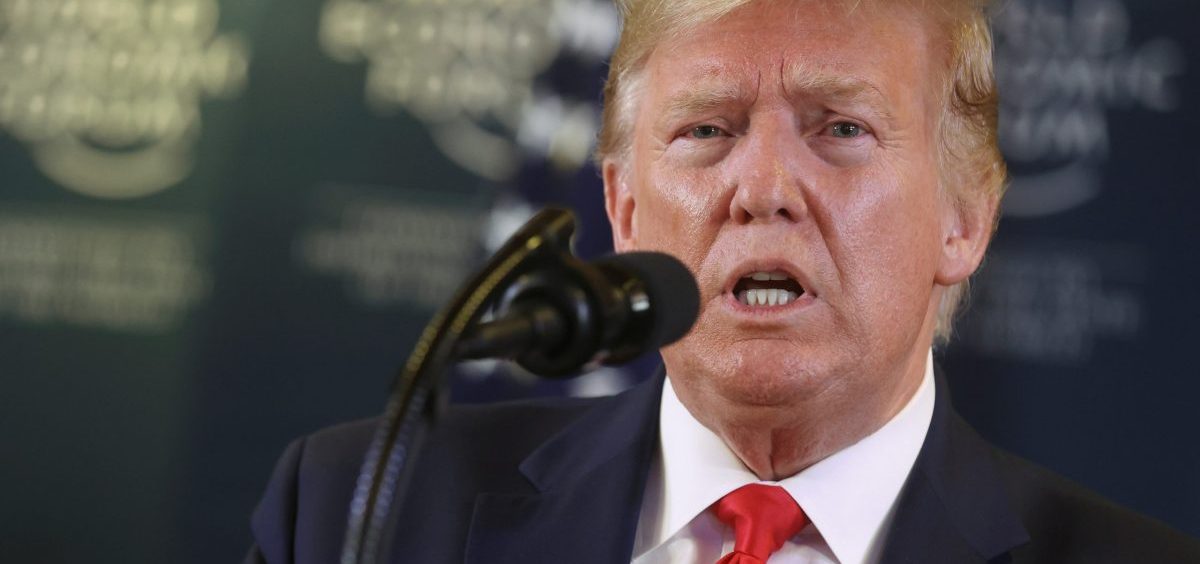News

Trump Says He’ll Add ‘A Few Countries’ To Controversial U.S. Travel Ban
By: Bill Chappell | NPR
Posted on:
Updated at 12:04 p.m. ET
President Trump says he’ll widen a controversial travel ban that prohibits nearly all people from seven countries from traveling or immigrating to the U.S., calling it “a very powerful ban” that’s necessary to ensure national security.
“We’re adding a couple of countries” to the ban, Trump said when asked about his policy shift at a news conference at the Davos World Economic Forum in Switzerland. He added, “We have to be safe. Our country has to be safe. You see what’s going on in the world. Our country has to be safe.”
According to The Wall Street Journal, which first reported on the White House plan to expand the ban, the Trump administration wants to double the scope of the ban by blacklisting seven more countries: Belarus, Eritrea, Kyrgyzstan, Myanmar, Nigeria, Sudan and Tanzania.
Trump did not share any more details about the ban’s expansion, saying, “it’s going to be announced very shortly.”
When a reporter asked Trump about the plan to expand one of the signature pieces of his immigration policy, Trump criticized how the legal battles over the ban have been portrayed, emphasizing that after some losses in lower courts, the Supreme Court sided with him in 2018.
Despite Trump’s assertion a wider travel ban was imminent, White House Principal Deputy Press Secretary Hogan Gidley said Wednesday that “there are no new announcements at this time.”
Calling the president’s travel ban a success, Gidley added, “if a country wants to fully participate in U.S. immigration programs, they should also comply with all security and counterterrorism measures” the U.S. requires.
The ban was put in place by Presidential Proclamation 9645, which is titled “Enhancing Vetting Capabilities and Processes for Detecting Attempted Entry into the United States by Terrorists or other Public-Safety Threats.”
The travel ban includes several criteria for the U.S. to evaluate foreign countries’ security practices, from whether they issue secure “ePassports” (with biometric data on a computer chip) to how much information they share with the U.S. Countries that are found to be “inadequate” are at risk of being hit by restrictions.
Trump signed the original version of the travel ban in his first week in office three years ago, triggering confusion and chaos in airports and legal challenges in federal courts.
The Supreme Court upheld the Trump administration’s third version of the ban, which bars nearly all travelers or immigrants from five majority-Muslim countries — Iran, Syria, Yemen, Libya and Somalia — as well as North Korea and Venezuela. The ban also originally included both Iraq and Sudan, but those countries were eventually removed from the restrictions.
The intense legal battles over the ban were resolved in 2018, when the Supreme Court backed Trump’s assertion of presidential power under the Immigration and Nationality Act – the 1965 law that originally abolished the U.S. quota system that limited immigrants based on their national origin.
Before the high court upheld Trump’s travel ban, federal courts had put two early iterations of the ban on hold after lawsuits accused them of discriminating against majority-Muslim nations. In court filings, challengers to the prohibition pointed to Trump’s numerous negative comments about Islam as proof of bias.
After those setbacks, the Trump administration added North Korea and Venezuela to the travel ban list. The restrictions on Venezuela apply mainly to members of government agencies and their families.
With additional reporting by NPR’s Ayesha Rascoe
9(MDI4ODU1ODA1MDE0ODA3MTMyMDY2MTJiNQ000))

